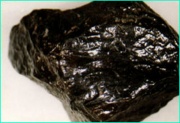Difference between revisions of "Carbonado"
Jump to navigation
Jump to search
(username removed) |
|||
| (2 intermediate revisions by 2 users not shown) | |||
| Line 2: | Line 2: | ||
== Description == | == Description == | ||
| − | A black or dark-color [ | + | A black or dark-color [[diamond]]. Carbonado diamonds have primarily been found in Brazil (Sao Salvador), Bahia, and Borneo. They are usually opaque, granular stones with no distinct cleavage. Carbonado diamonds are used for in [[abrasive]] coatings on drill bits, and grinding wheels. They are also used on rock cutting saws, glass cutters, phonograph needles, hardness testers, semiconductors, and wire-drawing dies. |
== Synonyms and Related Terms == | == Synonyms and Related Terms == | ||
| Line 8: | Line 8: | ||
black diamond; carbons; industrial grade diamond | black diamond; carbons; industrial grade diamond | ||
| − | == | + | ==Physical and Chemical Properties== |
| − | No cleavage. Slightly porous. | + | * No cleavage. |
| + | * Slightly porous. | ||
{| class="wikitable" | {| class="wikitable" | ||
| Line 21: | Line 22: | ||
|- | |- | ||
! scope="row"| Density | ! scope="row"| Density | ||
| − | | 3.1-3.3 | + | | 3.1-3.3 g/ml |
|} | |} | ||
| − | |||
| − | |||
| − | |||
| − | |||
== Comparisons == | == Comparisons == | ||
| Line 32: | Line 29: | ||
[[media:download_file_186.pdf|Properties of Common Abrasives]] | [[media:download_file_186.pdf|Properties of Common Abrasives]] | ||
| − | + | ==Resources and Citations== | |
| − | + | * Mineralogy Database: [http://www.webmineral.com/data/Diamond.shtml Diamond] | |
| − | == | ||
* R.M.Organ, ''Design for Scientific Conservation of Antiquities'', Smithsonian Institution, Washington DC, 1968 | * R.M.Organ, ''Design for Scientific Conservation of Antiquities'', Smithsonian Institution, Washington DC, 1968 | ||
| − | * ''Encyclopedia Britannica'', http://www.britannica.com Comment: "Carbonado." | + | * ''Encyclopedia Britannica'', http://www.britannica.com Comment: "Carbonado." Accessed: 26 Apr. 2004. |
* C.W.Chesterman, K.E.Lowe, ''Audubon Society Field Guide to North American Rocks and Minerals'', Alfred A. Knopf, New York, 1979 | * C.W.Chesterman, K.E.Lowe, ''Audubon Society Field Guide to North American Rocks and Minerals'', Alfred A. Knopf, New York, 1979 | ||
Latest revision as of 09:20, 20 May 2022
Description
A black or dark-color Diamond. Carbonado diamonds have primarily been found in Brazil (Sao Salvador), Bahia, and Borneo. They are usually opaque, granular stones with no distinct cleavage. Carbonado diamonds are used for in Abrasive coatings on drill bits, and grinding wheels. They are also used on rock cutting saws, glass cutters, phonograph needles, hardness testers, semiconductors, and wire-drawing dies.
Synonyms and Related Terms
black diamond; carbons; industrial grade diamond
Physical and Chemical Properties
- No cleavage.
- Slightly porous.
| Composition | C |
|---|---|
| Mohs Hardness | 10 |
| Density | 3.1-3.3 g/ml |
Comparisons
Properties of Common Abrasives
Resources and Citations
- Mineralogy Database: Diamond
- R.M.Organ, Design for Scientific Conservation of Antiquities, Smithsonian Institution, Washington DC, 1968
- Encyclopedia Britannica, http://www.britannica.com Comment: "Carbonado." Accessed: 26 Apr. 2004.
- C.W.Chesterman, K.E.Lowe, Audubon Society Field Guide to North American Rocks and Minerals, Alfred A. Knopf, New York, 1979
- G.S.Brady, Materials Handbook, McGraw-Hill Book Co., New York, 1971 Comment: p. 264
- Random House, Webster's Encyclopedic Unabridged Dictionary of the English Language, Grammercy Book, New York, 1997
- The American Heritage Dictionary or Encarta, via Microsoft Bookshelf 98, Microsoft Corp., 1998
